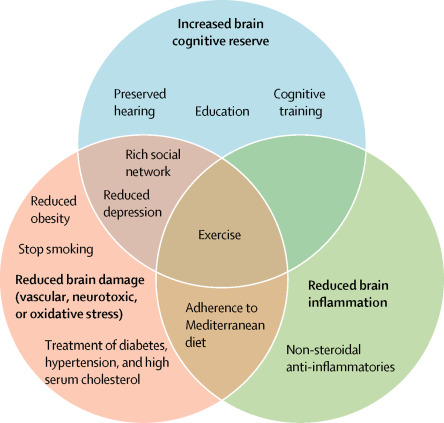It is Never too Late…..to Reduce Your Risk of Dementia
My practice focuses on abuse and neglect in nursing homes and one of the reasons for placement in nursing homes is a family member with dementia . In 2015, 47 million people were living with dementia. This number is projected to triple by 2050. We should all be interested in reducing our risk of dementia so we can age at home instead of in a nursing home. And putting aside the human cost of this diagnosis, the global cost of dementia in 2015 was close to $818 billion.
A recent study gives us some concrete steps to reduce the risk of dementia , at any age. According a study published by The Lancet Journal diet and exercise are key as this diagram shows

There are steps that can be taken at every age to reduce dementia risk:
• Early in life- increasing education
• Midlife – address hearing loss, high blood pressure and obesity
• Late in life- stop smoking, treat depression , increase social contact, stay active, and treat diabetes
Did you see that?……. Making changes even late in life makes a HUGE affect on reducing the risk of dementia. Researchers found that the changes made even later in life can reduce the risk of dementia by 15
The researchers also found that social contact and activities worked better than medications, antipsychotic drugs at treating agitation and aggression found in early dementia patients.
So, what happens if dementia hits?
Family members are usually the first line of support as substitute decision-makers. Parent-child roles reverse. Partner relationships change and tensions and responsibilities increase. So do dangers of elder abuse. This can be verbal or psychological abuse; neglect (including allowing self-neglect) such as ignoring medical or physical care needs; failure to provide access to health or social care; and withholding the necessities of life.
Contributing factors to elder abuse are many. Sometimes the caregiver needs care too. About 40% of family care givers have depression, anxiety or some form of severe psychological symptoms. They have worse physical health and lower quality of life.
What can help?
So now it is never too early or too late to reduce your risk dementia but don’t let your planning stop there, make sure you have the necessary documents prepared in advance. Consider who you would trust to make life decisions on your behalf. Decide how you want to be cared for; have advance care planning in place that may include end-of-life care. Don’t wait until it’s too late and someone else makes the decisions for you.
Don’t forget to join our mailing list to continue to receive news about nursing home abuse, Ohio injury law, and related topics.
Reference Links:
http://www.mcknightsseniorliving.com/news/dementia-risk-can-be-reduced-even-in-late-life-report/article/676597/
http://www.thelancet.com/pdfs/journals/lancet/PIIS0140-6736(17)31363-6.pdf
